Scroll down or click here to see book reviews by Kam Willliams.
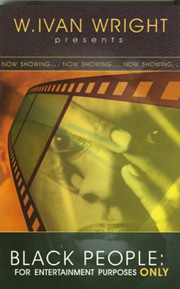 Black People: For Entertainment Purposes Only, W. Ivan Wright, Able Journey, ISBN # 1-9342-4946-8, $15.95. Black People: For Entertainment Purposes Only, W. Ivan Wright, Able Journey, ISBN # 1-9342-4946-8, $15.95.
What? The purpose of Black people is for America’s entertainment? That's the theme of W. Ivan Wright’s new novel, Black People: For Entertainment Purposes Only. Jurney is an author whose book has inflamed the African-American community as well as his own family, all because his book infers that the sole function of Blacks is for this country’s amusement. A politically sanctioned murder plot only adds to Jurney’s dilemma as the blood soon ribbons its way from a newly fallen victim, still seeking Jurney. The interesting paradox of this book’s title is the fact that when it speaks of perception and the questions of America’s entertainment rolodex, it is not primarily directed towards white America. Indeed, it is the perception via the lens of black America that profoundly dictates our social positioning and hence, our children’s vision of life’s horizons.
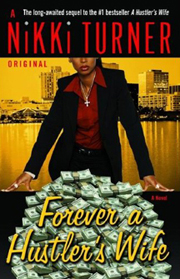 Forever A Hustler’s Wife, Nikki Turner, Ballantine, ISBN # 0-345-49385-9, $13.95. Forever A Hustler’s Wife, Nikki Turner, Ballantine, ISBN # 0-345-49385-9, $13.95.
Des, Virginia’s slickest gangsta, is about to become a dad when he is charged with the murder o his own attorney. But with Yarni, his gorgeous wife and a brilliant lawyer, calling the shots, Des isn’t going back to the slammer without a fierce fight. Even with the heat on, Des manages to take his game to the next level and finds a new hustle, one that will allow him to possess the three things all major players desire: money power and respect. He becomes a preacher. But when his nephew is killed in a high-stakes heroin trade and Des learns that someone close to him okayed the hit, the dyed-in-the-wool gangsta sets aside the Bible for the gospel of the streets – even if it means risking the one person who’s always had his back.
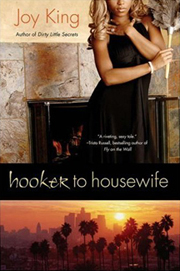 Hooker To Housewife, Joy King, St. Martin’s Griffin, ISBN # 0-312-35408-8, $13.95. Hooker To Housewife, Joy King, St. Martin’s Griffin, ISBN # 0-312-35408-8, $13.95.
Tyler Blake is the new “It” girl in Hollywood, and dating one of the hottest directors in Tinseltown. Unfortunately, he’s also married. And adding more drama to the mix is T-Roc, a controlling ex-flame from Tyler’s past, who has once again found a way into her life. Then, just when she believes her life can’t get anymore complicated, Tyler falls in love with Andre Jackson. He has it all – money, fame, movie-star looks and the kind of bad-boy reputation that Tyler has vowed to stay away from. Andre also has Chantal Morgan, his long-term girlfriend and the mother of his child, who is determined to go from hooker to housewife. But when Andre is cast opposite Tyler in the lead role of her new movie, sparks fly. However, Tyler may have finally met her match in Chantal, the femme fatale of all industry chicks.
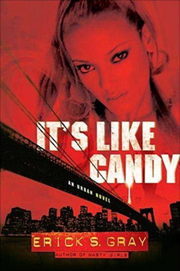 It’s Like Candy, Erick S. Gray, St. Martin’s Griffin, ISBN # 0-312-34997-1, $14.95. It’s Like Candy, Erick S. Gray, St. Martin’s Griffin, ISBN # 0-312-34997-1, $14.95.
Sisters River and Starr flee their abusive home and their drug-addicted mother when they are only teenagers. And on the cold, hard streets they lose sight of each other as they find their own hustles in order to survive. River joins a stick-up crew, but she doesn’t know that Big Red and Twinkie have a secret that she’s not in on. When she falls in love with Eric, one of their victims, all she wants is to find her baby sister and settle down with her new love. By the time she turns 16, Starr is working for a pimp and turning tricks daily. But when an assault by one of her “dates” lands her in the hospital, she meets a woman who wants to help her change her life. Starr’s heart is too hardened to believe in second chances, but she soon begins to long for something more than selling her body just to survive. But the game doesn’t give up its players easily.
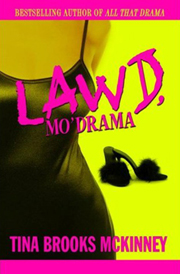 Lawd, Mo’ Drama, Tina Brooks McKinney, Strebor Books, ISBN # 1-59309-052-8, $14. Lawd, Mo’ Drama, Tina Brooks McKinney, Strebor Books, ISBN # 1-59309-052-8, $14.
McKinney is back with the hotly anticipated sequel to All That Drama, with Leah and Sammie, two friends just trying to make it. They try their best to avoid drama, but somehow it always returns. Leah thought she had found and married “The Good Man,” but after a few years of marriage and three children, her “good man” has eyes that are constantly roaming. Her bad turns to worse when she finds out one of her children is autistic and her house will soon be foreclosed. In her lowest moment, she turns to Sammie. Sammie hasn’t changed much since Marie passed away – she’s still looking for love in all the wrong places. Finally these two realize they can only count on themselves – and each other.
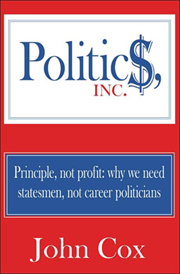 Politics, Inc.: Principle, Not Profit: Why We Need Statesmen, Not Career Politicians, John Cox, AuthorHouse, ISBN # 1-4259-3613-X, $19.95. Politics, Inc.: Principle, Not Profit: Why We Need Statesmen, Not Career Politicians, John Cox, AuthorHouse, ISBN # 1-4259-3613-X, $19.95.
Many books preaching about how to fix politics and public policy come from the very people who burdened us with the defective politics and public policy in the first place. So when a book comes along from someone who isn’t rationalizing and justifying his role in a messed-up America, you’ve got a real find. In Politics, Inc., John Cox sketched with the passion and clarity of a Ronald Reagan a blueprint for national prosperity, health, security and well being, with you in mind. Here is a work of distinctive common sense, unclouded by utopian or self-serving demands of politicians and commentators who doubt the ability of Americans to solve their own problems.
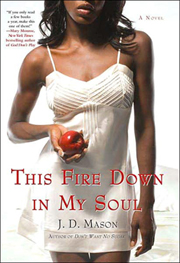 This Fire Down In My Soul, J.D. Mason, St. Martin’s Press, ISBN # 0-312-32646-7, $21.95. This Fire Down In My Soul, J.D. Mason, St. Martin’s Press, ISBN # 0-312-32646-7, $21.95.
This Fire Down in My Soul is an unforgettable story of love, sex and obsession. When Faylene Watkins starts counseling the women of his congregation, three very different women teach her just how dangerous this combination can be. Choir girl Elise thinks she’s found a good man in Jay, a truck driver, who came blowing into her life one sultry night. When she’s ready for happily ever after, however, he realizes that he can’t walk away from his wife and children. When fuul-of-herself single ministry leader Renee takes her latest interior decorating job, she thinks her client’s husband is hot, and together they’re on fire. For 25 years, Tess’ life revolved around her unfaithful husband and their two wonderful sons. Now that the kids have left the nest, she wants to spread her wings, and she gets a new job and a social life outside the church when a most forbidden man steps into the picture.
 Weapons Of Mass Seduction, Lori Bryant-Woolridge, Harlem Moon Broadway, ISBN # 978-0-7679-2665-2, $12.95. Weapons Of Mass Seduction, Lori Bryant-Woolridge, Harlem Moon Broadway, ISBN # 978-0-7679-2665-2, $12.95.
Forty-something and still single, music-video exec Pia Jamison has given up her grandiose ideas on men and marriage, but not motherhood. Her biological clock is on red alert, but after years of self-imposed celibacy, she has no clue how to attract the man she needs to get the baby she wants. Pia’s savvy assistant tricks her into going to a flirting workshop called Weapons of Mass Seduction, where she learns about the art of sensuality and flirtation and turns into a bona fide bombshell. Now Pia is happily pregnant, but she unexpectedly falls in love – and not with the father of her unborn child.
 We’ll Never Tell, Kayla Perrin, St. Martin’s Griffin, ISBN # 0-312-34016-8, $13.95. We’ll Never Tell, Kayla Perrin, St. Martin’s Griffin, ISBN # 0-312-34016-8, $13.95.
Shandra James is a man stealer. It’s a sport to her, a game that she always wins. As a pledge of the exclusive Alpha Sigma Pi sorority, she should know her place, and know not to throw herself at her sister’s boyfriend. But she’s marked a new target: Henry Reid. Henry’s fiancée, Phoebe, and her sorority sister Miranda and Camille decide to teach Shandra a lesson one night, a lesson that involves humiliation but nothing more. But unexpectedly the lesson turns deadly and the three women find themselves facing three new rules: Never mention what happened that night; protect one another; and tell no one. Yet when a murderer comes calling, they each discover that rules are meant to be broken.
 When Heaven Smiles, David Shabazz, Awesome Records, ISBN # 1-893680-09-8, $9.95. When Heaven Smiles, David Shabazz, Awesome Records, ISBN # 1-893680-09-8, $9.95.
During the Civil Rights struggle of the 1960’s, the pride of Black Americans was elevated when the Black Arts Movement popularized the slogan "Black is beautify." In his debut book of poetry, When Heaven Smiles, author David Shabazz is laying the groundwork for that slogan's return. When Heaven Smiles is a collection of poems dedicated to African-American women. According to the author, the book was written to celebrate the beauty of black women and to pay tribute to them for their commitment to holding black families together. This book is Shabazz’ way of saying thank you to Black women everywhere and to tell them they are heaven-on-earth to a Black man.
Kam’s Picks - Book Reviews by Kam Williams

Campus CEO: The Student Entrepreneur’s Guide to Launching a Multimillion-Dollar Business, Randal Pinkett, Kaplan Publishing, Paperback, $16.95, 288 pages, illustrated, ISBN: 1-4195-9371-0.
What has been the secret to my success? A big part of it was becoming a student entrepreneur… You don’t have to wait until after graduation to find a career, make money, and begin doing what you love. Instead, you can blaze a pathway to success and generate income now by starting your own business on campus.
In doing so, you’ll take advantage of that unique period in your life--while you’re a student—when a range of once-in-a-lifetime perks, advantages, and resources are available to you. As a student entrepreneur, you’ll have access to a number of free resources, from office equipment and computer hardware to graphic design services and office space…
You’ll have virtually unrestricted, one-on-one contact with some of the best ‘consultants’ money can buy… the very same professors and teachers you’re learning from every day… The list of benefits for student entrepreneurs goes on and on.
--Excerpted from the Introduction
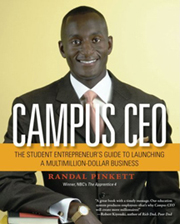 You might remember Randal Pinkett as the brilliant Rhodes Scholar with an MBA and PhD from MIT who won America’s heart while on his way to landing a job with Donald Trump during the fourth season of The Apprentice. But it is important to remember that way before he found fame on that phenomenally popular, reality-TV series Randal was already the chairman and CEO of BCT Partners, the very successful consulting firm he had founded years before while still an undergraduate at Rutgers University. You might remember Randal Pinkett as the brilliant Rhodes Scholar with an MBA and PhD from MIT who won America’s heart while on his way to landing a job with Donald Trump during the fourth season of The Apprentice. But it is important to remember that way before he found fame on that phenomenally popular, reality-TV series Randal was already the chairman and CEO of BCT Partners, the very successful consulting firm he had founded years before while still an undergraduate at Rutgers University.
In Campus CEO, the savvy entrepreneur now shares the strategies he relied upon to turn his campus-based business idea into a profitable ongoing operation. Pointing out that the educational system is designed to produce employees, he suggests instead aiming at being your own boss.
Furthermore, he says there’s no reason to wait till after graduation to get started, since many a mega-corporation began as the brainchild of a college student, including Microsoft, Google, Dell, Pizza Hut, Yahoo!, Federal Express, Netscape, Kinko’s and Napster, to name a few. And since the cost of a higher education has risen dramatically in recent years, most students nowadays need to work to pay for part of their tuition. So, Randal questions the wisdom of being satisfied with ”dead-end jobs that have no relevance to your college program or career goals” when you have the option of getting a head start on life by launching your own moneymaking venture.
Broken down into four sensible sections, this useful how-to guide opens with “Starting Your Business,” which imparts plenty of practical advice about creating a plan before you take the leap. Then, there’s “Financing Your Business,” which intelligently addresses the issues of raising capital and managing your risks.
“Balancing Business and Education” comes next, which stresses the need not only to focus on academics but to seek out assistance in your after school endeavor from professors and mentors. And the final section, “Growing Your Business,” obviously concerns itself with taking advantage of opportunities to expand.
Mixed in betwixt and between all this sage advice are numerous profiles of accomplished campus CEOs, each case history proof-positive that the system works. By books end, the only logical conclusion one might make is, ‘Why be the apprentice when you can be The Donald?”
Crisis of the Black Intellectual, W.D. Wright, Third World Press, Paperback, $26.95, 380 pages, ISBN # 0-88378-251-0.
Today there are many Black intellectuals who do not think of Black people as a people and have no wish to do so. They think of themselves as individuals and look upon Blacks that way as well. And this idea is espoused by more people than just the Black conservatives, although they have made a fetish of this kind of conception and Black social response in America.
Black intellectuals are mainly from the Black middle-class… [which] has lost- if it has not abandoned altogether- its historical mission, which was to help Black people as a people, as well as Black individuals, to advance and to be free in America.
--Excerpted from the Introduction
 With the publishing of The Crisis of the Negro Intellectual back in 1967, Harold Cruse issued a clarion call to the emerging black intelligentsia to remember and remain faithful its cultural roots. Now, 40 years later, Crisis of the Black Intellectual reassesses the state of the African-American egghead and makes the case that an equally-urgent appeal to a collective consciousness-raising is in order. With the publishing of The Crisis of the Negro Intellectual back in 1967, Harold Cruse issued a clarion call to the emerging black intelligentsia to remember and remain faithful its cultural roots. Now, 40 years later, Crisis of the Black Intellectual reassesses the state of the African-American egghead and makes the case that an equally-urgent appeal to a collective consciousness-raising is in order.
Taking no prisoners in the process, W.D. Wright initiates a sharp-tongued discourse in order to shake Ivory Tower Blacks out of what he refers to as their “comfort groove.” The author, Professor Emeritus at Southern Connecticut University, repeatedly resorts to cogent, if incendiary reasoning to indict bourgie brothers and sisters out of their middle-class malaise, so that they again empathize with the predicament of less-fortunates yet to get their piece of the pie.
Wright communicates with a sword-like clarity, such as when he writes about the nature of the debt owed by better-off African-Americans to those still stuck in the ‘hood. “No Black intellectual has to identify with being Black or even with Black history, Black culture, or Black social life… but any time [they] write or talk in a public manner about Black History, Black identity, Black life, and the means Blacks should seek to advance or be free in America, they forfeit their insulated individualist status.”
Noting the emergence of the Black neo-con, the author astutely observes that “Whites no longer speak on behalf of Blacks like they used to do.” Instead, he argues that racist whites rely on Black surrogates willing to present themselves as speaking for Black people while really representing the interests of whites. I won’t name names (except for the most obvious, Ray Nagin), but many just such an African-American leader came to mind while perusing the pages of this seminal sequel to Cruse’s opus.
In sum, if W.D. Wright’s aim with Crisis of the Black Intellectual was to target his self-satisfied colleagues and to shake them out of their complacency, then bull’s eye!
In-Dependence from Bondage, Claude McKay and Michael Manley: Defying the Ideological Clash and Policy Gaps In African Diaspora Relations, Lloyd D. McCarthy, Africa World, Paperback, $24.95, 204 pages, illustrated, ISBN # 1-59221-465-7.
Claude McKay (1890-1948) and Michael N. Manley (1924-1997) shared a common commitment to the struggle of African Diaspora people for liberation and justice. It is my contention that although they came from different historical periods, professional backgrounds and intellectual traditions, they arrived at a common awareness that the dominant political ideology of the North is incongruous to the history and development of people in the African Diaspora and the Global South.
McKay and Manley viewed socialism and socialist strategy as the political model for sustainable development- a form of democratic socialism that is ‘organic’ to the racial and class history of people of African descent in the U.S. and Jamaica. And so, essentially, this book is about the struggles of McKay and Manley for the African Diaspora and the common idea that they believe is more appropriate for people in the African Diaspora to use in the continuation of their struggle.
--Excerpted from the Introduction
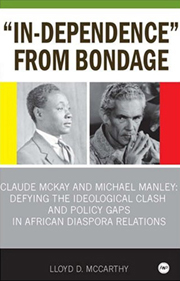 Does it make sense to attempt to reconcile the lyrical lines of a celebrated poet with the political ideology of a head of state? Should such seeming apples and oranges even be discussed in the same context? As ridiculous as the idea might sound at first blush, Lloyd McCarthy has managed to pull off just such an unusual feat in In-Dependence from Bondage. Does it make sense to attempt to reconcile the lyrical lines of a celebrated poet with the political ideology of a head of state? Should such seeming apples and oranges even be discussed in the same context? As ridiculous as the idea might sound at first blush, Lloyd McCarthy has managed to pull off just such an unusual feat in In-Dependence from Bondage.
he book compares and contrasts the worldviews of a couple of late, great Jamaican thinkers, namely, the poet and novelist Claude McKay and the socialist Prime Minister Michael Manley. According to the author, both of his subjects embraced a collective Caribbean consciousness, espousing resistance by “the millions of brutally uprooted and transplanted Africans against Western elite oppression.”
McKay, a Harlem Renaissance writer hailed as “The Peasant Poet” and “The People’s Poet,” wrote from a working class as opposed to a bourgeois perspective. And Manley, likewise, was a progressive with a proletarian world view.
This trenchant treatise tackles such topical issues as globalization and the extent to which ruthless capitalists will go to exploit fellow humans. Consider the sentiment conveyed by McKay in a poem entitled “Enslaved” which reads in part: ”Oh when I think of my long-suffering race,/ For weary centuries, despised oppressed/ Enslaved and lynched, denied a human place/ In the great life line of the Christian West.”
Meanwhile, Manley can be seen as making similar sort of statements, as reflected in this 1974 speech advocating the escalation of the anti-apartheid movement:
“A country like Jamaica must be totally dedicated to the active support of all those measures that can lead to the overthrow of the apartheid regime in South Africa… In other words, where wars of liberation for the purpose of establishing national freedom are being fought, the objective of freedom legitimizes them and commands our unswerving support.”
To his credit, author McCarthy points out that the pair’s positions don’t always overlap, since Manley was a Marxist, while McKay had been a Communist but developed an aversion to Stalin’s interpretation of the philosophy. Nonetheless, this opus overall convincingly makes its case that the two shared the belief that imperialism, racism and neocolonialism were the major impediments to the progress of Blacks and other non-white peoples living on the planet.
The Stork Market: America’s Multi-Billion Dollar Unregulated Adoption Industry, Mirah Riben with foreword by Evelyn Robinson, Advocate Publications, Paperback, $18.50, 260 pages, illustrated, ISBN # 1-4276-0895-4.
Adoption pits woman against woman, rich against poor, making it painfully difficult to look at and admit. Adoption is racist and classist and often exploits women and commodifies their babies.
Mothers who are resourceless and struggling to keep their family together can either be offered the help they need to stay together or be seen as a source of supply to meet a demand. Mothers and other family members in developing countries unable to feed their babies could be sent the funds they need to do so, or have their misfortune exploited for another’s advantage.
--Excerpted from Chapter 2: Motherhood, Myths and Metaphors
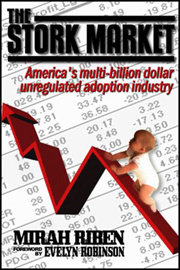 In the rush to anoint icons like Madonna and Angelina Jolie for sainthood following their adoptions of babies from Africa and Asia, no one seems to be stopping to ask how widespread this practice might be or whether it’s in the best interest in the children and their birth parents. But common sense ought to tell you that no mother really wants to surrender her offspring to a stranger from another culture or country, especially when the reason really has more to do with money than with maternal instincts. In the rush to anoint icons like Madonna and Angelina Jolie for sainthood following their adoptions of babies from Africa and Asia, no one seems to be stopping to ask how widespread this practice might be or whether it’s in the best interest in the children and their birth parents. But common sense ought to tell you that no mother really wants to surrender her offspring to a stranger from another culture or country, especially when the reason really has more to do with money than with maternal instincts.
Sadly, this readily identifiable and burgeoning phenomenon is not at all limited to celebrities, but a big business which is depleting the Third World in much the same way those regions have been drained of their natural resources. Fortunately, one intrepid reporter, Mirah Riben, has had the guts to investigate this shameful trafficking in infants, and she is now blowing the cover off the racist racket in The Stork Market: America’s Multi-Billion Dollar Unregulated Adoption Industry.
In fact, Ms. Riben has been speaking out about the need to reform, humanize, and de-commercialize American adoption practices for nearly three decades. She first started to shed some light on this complex issue back in 1988 with the publication of her previous book, The Dark Side of Adoption. But The Stork Market is an even more thoroughly-researched expose’ which zeroes-in on every aspect of the Black market baby trade.
As a staunch family advocate, the author also takes aim here at foster parenting, pointing out that “The same funds used to support foster care could be used to help preserve families and eliminate child removal.” However, the bulk of this invaluable book covers the corruption in the adoption industry: the scams, coercion and exploitation rampant in a market based on supply and demand where prices are based such factors as age and skin color, and the cost of the “merchandise” is set as high as the often desperate consumers are willing to pay.
Highly-recommended for anyone touched by adoption in any way, whether considering it, working in the field, or if simply interested in child protection and family preservation.
The United States v. George W. Bush Et Al (U.S. v. Bush), Elizabeth de la Vega, Seven Stories, Paperback, $14.95, 256 pages, ISBN # 1-58322-756-3.
After analyzing the evidence in light of the applicable law, I’ve determined that we already have more than enough information to allow a reasonable person to conclude that the President conducted a wide-ranging effort to deceive the American people and Congress into supporting a war against Iraq. In other words, in legal terms, there is probable cause to believe that Bush, Cheney, Rumsfed, Rice, and Powell violated Title 18, U.S. Code sec. 371, which prohibits conspiracies to defraud the United States…
My goal is to send the message home to whomever will listen [that]:
- The President has committed fraud.
- It is a crime in the legal, not merely the colloquial, sense.
- It is not a victimless crime.
- We cannot shrug our shoulders and walk away.
--Excerpted from the Introduction
 More than anything else, the 2006 mid-term election was a referendum on the war. And the American people delivered a clear mandate by delivering enough votes to shift control of both the Senate and the Houses of Representatives to the democrats. Yet, inexplicably, last November, well before the reconstructed Congress even had an opportunity to convene, Nancy Pelosi (D-CA), the new Speaker of the House, announced that there would be no impeachment hearings. More than anything else, the 2006 mid-term election was a referendum on the war. And the American people delivered a clear mandate by delivering enough votes to shift control of both the Senate and the Houses of Representatives to the democrats. Yet, inexplicably, last November, well before the reconstructed Congress even had an opportunity to convene, Nancy Pelosi (D-CA), the new Speaker of the House, announced that there would be no impeachment hearings.
Unfortunately, this hands-off approach appears only to have emboldened the Bush Administration which has since proceeded to ignore the crystal clear message just sent by the electorate by increasing the number of troops stationed in Iraq by 20,000. Furthermore, it has also come to light that on December 7, the White House ostensibly exerted undue influence on the Justice Department by having Attorney General Alberto Gonzales fire eight U.S. attorneys in a patently political, tactical maneuver.
Should the President have been impeached for having gotten the country into the war based on untruths? Were there sufficient legal grounds to do so? Fortunately, thanks to former assistant U.S. Attorney Elizabeth de la Vega, we have an excellent idea of exactly what the case might have looked like. In her book, U.S. v. Bush, Vega, relies upon her 20 years of experience as a federal prosecutor to stage the likely indictment of the President and his senior advisors which Pelosi had passed on.
As an attorney, I found the author’s hypothetical grand jury scenario not only credible and compelling, but also enlightening and, ultimately, damning. So, if you’re inclined to weigh all the evidence, don’t be surprised to find yourself agreeing with the prosecutor that there’s probable cause to believe that the Bush Administration actually deliberately deceived Congress and the rest of America.
|
